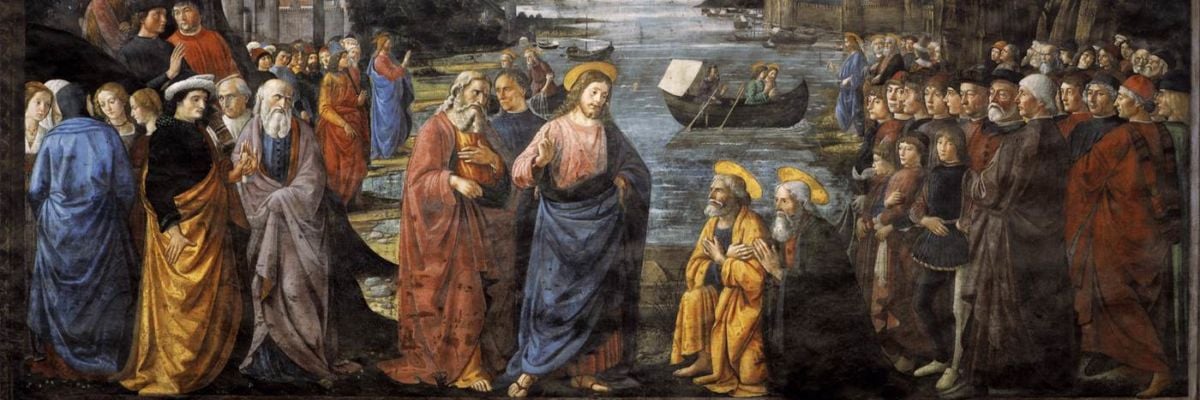
Homily for the Third Sunday in Ordinary Time, 2021
I tell you, brothers and sisters, the time is running out.
From now on, let those having wives act as not having them,
those weeping as not weeping,
those rejoicing as not rejoicing,
those buying as not owning,
those using the world as not using it fully.
For the world in its present form is passing away.-1 Cor. 7:29-31
After John had been arrested,
Jesus came to Galilee proclaiming the gospel of God:
“This is the time of fulfillment.
The kingdom of God is at hand.
Repent, and believe in the gospel.”As he passed by the Sea of Galilee,
he saw Simon and his brother Andrew casting their nets into the sea;
they were fishermen.
Jesus said to them,
“Come after me, and I will make you fishers of men.”
Then they abandoned their nets and followed him.
He walked along a little farther
and saw James, the son of Zebedee, and his brother John.
They too were in a boat mending their nets.
Then he called them.
So they left their father Zebedee in the boat
along with the hired men and followed him.-Mark 1:14-20
Tough stuff, all this. I mean, being detached from the things that are the nearest and dearest to us, our closest human relationships, our emotions of joy and sadness, our possessions, our work in this world; abandoning, like Peter and Andrew, James and John their livelihood and even their old father!
How is this, on the face of it, good news for us?
And how on earth could we really do what St. Paul tells us to do, unless disasters intervened and took these persons, experiences, and possessions from us? What would make someone willing to choose to do what the apostle tells us to do, or to imitate those four first apostles?
The answer is very simple, but before we give it, let’s not forget that Pope Francis has declared every third Sunday of “ordinary time” to be a day for celebrating the Word of God in a special manner. So I will give you first this wonderful passage he quotes from the amazing and incomparable Syrian Father, St. Ephrem the Deacon, doctor of the Church:
“Who is able to understand, Lord, all the richness of even one of your words? There is more that eludes us than what we can understand. We are like the thirsty drinking from a fountain. Your word has as many aspects as the perspectives of those who study it. The Lord has colored his word with diverse beauties, so that those who study it can contemplate what stirs them. He has hidden in his word all treasures, so that each of us may find a richness in what he contemplates” (Commentary on the Diatessaron, 1, 18).
As I read today’s familiar and demanding words, I found a richness, a treasure, an aspect that came to me right away but which I might not possess; it might have eluded me, as Ephrem says. This aspect is the element that simplifies, and even makes consoling and reassuring, Paul’s demanding words.
Maybe you already guessed it. It is Love, the love whereby we are attached to God and so automatically detached from created things that pass away. Paul has this to say about love:
Love never ends… For now we see in a mirror, dimly, but then we will see face to face. Now I know only in part; then I will know fully, even as I have been fully known. And now faith, hope, and love abide, these three; and the greatest of these is love (1 Cor. 8,12-13).
When we love God, this love is continuous with the love that we will have in the bliss of heaven. It is really true that every other good thing we have in this passing life will pass away, and the only thing that lasts forever is the love that is the source of our merit and the measure of the depth of a happiness we never can lose, and from which we must and will never be detached.
All of the other good things God gives us are given to be loved by us in view of this eternal love that does not pass away and cannot be lost. This love will enable us to “know fully as we have been fully known.” And then our love relationships, our feelings, our works, our possessions, the whole span of our earthly loves, will shine in the light of God’s loving plan.
In the meantime, we keep in mind—in all those whom we love and in all we feel, and suffer, and have, and do—that the love that is ours by grace will be the great, lasting “one thing necessary” (Luke 10:42). If we are united to him, all that is not love will pass away, and we will be truly and everlastingly happy.
And we will find to our great delight that the good persons and things that we so feared to lose are everlastingly ours in the loving light of the face-to-face vision of the One who gave them to us. And that is really good news, a gospel worthy of the name.



